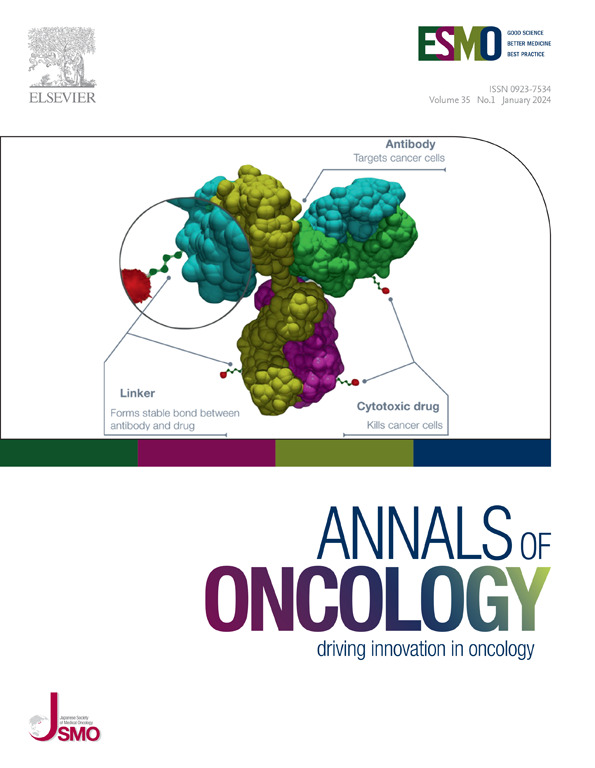Genomic correlates of response and resistance to the irreversible FGFR1-4 inhibitor futibatinib based on biopsy and circulating tumor DNA profiling
IF 56.7
1区 医学
Q1 ONCOLOGY
引用次数: 0
Abstract
Background
Futibatinib is the only covalent inhibitor of FGFR1-4 to gain regulatory approval in oncology. In this article, we present genomic analyses of tissue biopsies and circulating tumor DNA (ctDNA) from patients with 1 of nearly 20 tumor types treated with futibatinib in the phase I/II FOENIX study.
Patients and methods
Eligible patients included those with ctDNA samples collected per protocol at baseline and/or progression on futibatinib in the phase Ib portion of the study for FGF/FGFR-altered advanced solid tumors or the phase II portion of the study for FGFR2 fusion/rearrangement-positive cholangiocarcinoma. Assessments included analytical concordance between tumor and ctDNA analyses for detection of FGFR alterations, association of ctDNA-detected co-occurring genomic alterations with response to futibatinib, and determination of patterns of acquired resistance following progression on futibatinib.
Results
Among 300 patients treated with futibatinib, 226 were eligible for this analysis, including 139 (62%) with cholangiocarcinoma. Among patients with known FGFR2 fusions/rearrangements, FGFR1 fusions, FGFR3 fusions, or FGFR2 amplifications per tissue analysis, detection rates in ctDNA for these aberrations were 84%, 0%, 11%, and 59%, respectively. Objective response rates on futibatinib were not significantly different between patients with TP53-altered versus -unaltered solid tumors; progression-free survival was reduced in patients with CDKN2B-altered versus -unaltered cholangiocarcinoma (median 4.8 versus 11.0 months; P = 0.03). Acquired resistance to futibatinib was frequently polyclonal and driven by an array of mutations within the relevant FGFR kinase domain, predominantly V565L, V565F, and N550K variants.
Conclusions
In this largest and most systematic analysis of acquired resistance to an FGFR inhibitor from prospective clinical trials, emergence of secondary FGFR2 kinase domain mutations was observed in most patients receiving clinical benefit to futibatinib. ctDNA analysis shows clinically relevant potential as a noninvasive method for assessing genomic profiles, identifying patients who may benefit from FGFR inhibitor treatment, and exploring acquired resistance mechanisms.
基于活检和循环肿瘤DNA分析的对不可逆FGFR1-4抑制剂富替替尼的反应和耐药的基因组相关性
背景:Futibatinib是唯一获得肿瘤学监管部门批准的FGFR1-4共价抑制剂。在这里,我们介绍了在I/II期FOENIX研究中,使用福替替尼治疗的近20种肿瘤类型之一的患者的组织活检和循环肿瘤DNA (ctDNA)的基因组分析。患者和方法:符合条件的患者包括:在FGF/ fgfr改变的晚期实体瘤研究的Ib期部分,或FGFR2融合/重排阳性胆管癌研究的II期部分,在基线和/或福替替尼治疗进展时根据方案收集ctDNA样本的患者。评估包括肿瘤和检测FGFR改变的ctDNA分析之间的分析一致性,ctDNA检测的共同发生的基因组改变与对福替替尼的反应的关联,以及福替替尼进展后获得性耐药模式的确定。结果:在300例接受福替替尼治疗的患者中,226例符合分析条件,其中139例(62%)为胆管癌患者。在每个组织分析中已知FGFR2融合/重排、FGFR1融合、FGFR3融合或FGFR2扩增的患者中,ctDNA中这些畸变的检出率分别为84%、0%、11%和59%。TP53改变与未改变的实体瘤患者使用福替替尼的客观有效率无显著差异;CDKN2B改变的胆管癌患者与未改变的胆管癌患者的无进展生存期降低(中位数,4.8个月对11.0个月;P = 0.03)。获得性对福替替尼的耐药通常是多克隆的,并由相关FGFR激酶结构域内的一系列突变驱动,主要是V565L、V565F和N550K变体。结论:在这项前瞻性临床试验中对FGFR抑制剂获得性耐药的最大规模和最系统的分析中,在大多数接受福替替尼临床获益的患者中观察到继发性FGFR2激酶结构域突变。ctDNA分析显示,作为一种评估基因组谱、识别可能受益于FGFR抑制剂治疗的患者和探索获得性耐药机制的非侵入性方法,ctDNA分析具有临床相关潜力。
本文章由计算机程序翻译,如有差异,请以英文原文为准。
求助全文
约1分钟内获得全文
求助全文
来源期刊

Annals of Oncology
医学-肿瘤学
CiteScore
63.90
自引率
1.00%
发文量
3712
审稿时长
2-3 weeks
期刊介绍:
Annals of Oncology, the official journal of the European Society for Medical Oncology and the Japanese Society of Medical Oncology, offers rapid and efficient peer-reviewed publications on innovative cancer treatments and translational research in oncology and precision medicine.
The journal primarily focuses on areas such as systemic anticancer therapy, with a specific emphasis on molecular targeted agents and new immune therapies. We also welcome randomized trials, including negative results, as well as top-level guidelines. Additionally, we encourage submissions in emerging fields that are crucial to personalized medicine, such as molecular pathology, bioinformatics, modern statistics, and biotechnologies. Manuscripts related to radiotherapy, surgery, and pediatrics will be considered if they demonstrate a clear interaction with any of the aforementioned fields or if they present groundbreaking findings.
Our international editorial board comprises renowned experts who are leaders in their respective fields. Through Annals of Oncology, we strive to provide the most effective communication on the dynamic and ever-evolving global oncology landscape.
 求助内容:
求助内容: 应助结果提醒方式:
应助结果提醒方式:


